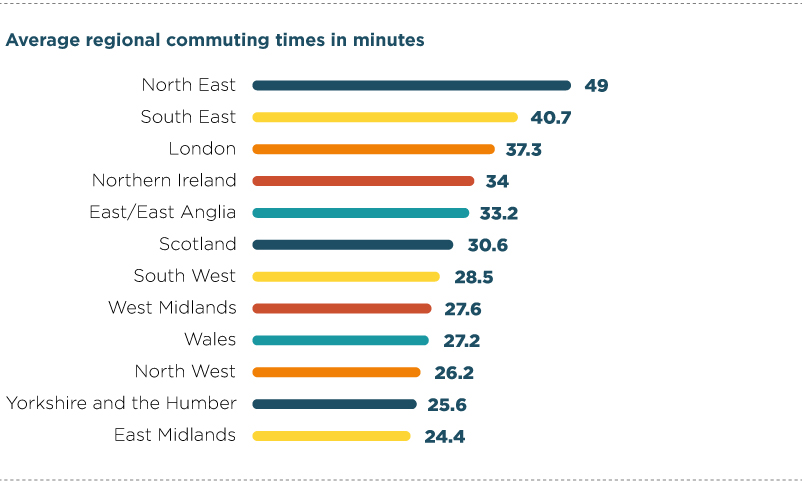Whatever the area of the country, most people have a psychological one-hour barrier when it comes to commutes, according to Kate Eales, National Head of Lettings at Strutt & Parker.
‘Commuting is largely down to family life – it’s about good schools and having a local support network of people,’ she explains. ‘But enjoying a healthy work-life balance is also becoming important, so there is a limit to how far people will travel daily for work.’
The importance of local connections and support is reflected in the research. Nearly half of respondents commute because they have friends and family in the area, while 41% cited good local schools near their home.
But the survey also reveals the negative effects of commuting, with just under half of people saying the journey to and from work means they are often tired, and 40% claiming it makes them less productive.
However, the overall impact of commuting is a little more nuanced. Researchers from the University of the West of England (UWE) Bristol examined the effect commuting had on the wellbeing of more than 26,000 employees in England over a five-year period.
The study revealed that, all else being equal, every extra minute spent commuting reduces job satisfaction and leisure time – but there was a key benefit, too. Longer commutes actually made people feel more positive about their lives.
‘People take on longer commutes for reasons relating to improving employment, housing and family situations,’ explains Dr Kiron Chatterjee, Associate Professor in Travel Behaviour at UWE Bristol. ‘And these factors serve to increase life satisfaction.’
Of course, commuting isn’t the only solution to living and working in different locations. Strutt & Parker’s research found that a fifth of employers now offer flexible working: balancing days in the office with time spent at home.
It’s a trend that’s growing, according to Simon Roberts of Strutt & Parker’s Gerrards Cross office.
‘Employers are increasingly supportive of working from home, driven in part by new technology,’ he explains. ‘One question we’re regularly asked by buyers is, “what is the local broadband speed?”’
Around half of all the properties Simon sells are bought by people who work in London, and their requirements are changing.
‘Buyers are now looking for ancillary accommodation suitable for home working because they often don’t have to be in the office every day, which makes commuting a lot easier,’ he says.
Robin Opie, a consultant on property interiors, agrees. He points out that informal working conditions – from the gig economy to freelance consultants – are making us think about our homes in a new way.
‘People want to check on floor space for a home office or judge if the garden is large enough for a remote office,’ he says. ‘Whether it’s the number of bedrooms or the potential to expand into the loft, what we want is changing every year as the boundaries of work and home life blur.’
This makes the future exciting but also daunting, as our working and domestic lives undergo a fundamental change.
‘And that future is already here,’ explains Strutt & Parker’s Vanessa Hale. ‘If you leave London on Thursday, you’ll find that the trains and roads are busier than on Friday evenings as people head out of town early and work a day at home.
‘It’s just one sign of a more radical shift as employers and employees navigate the new relationship between housing and work. A few companies are even helping to pay for staff accommodation so employees can live closer to their jobs – a little like how they now subsidise season tickets for commuters.’
Only one thing is certain: that the idea of leaving work behind when you walk out of the office is firmly rooted in the past. Instead, we may all soon be walking out of the office – and straight into our living rooms.





